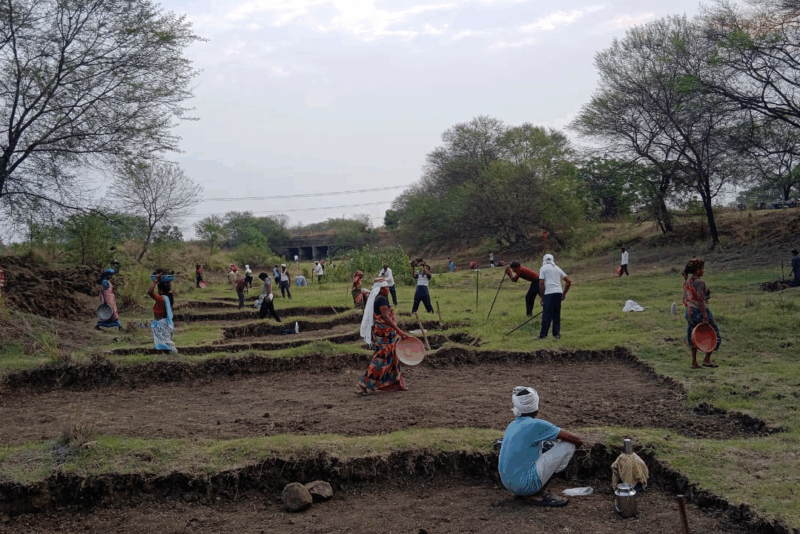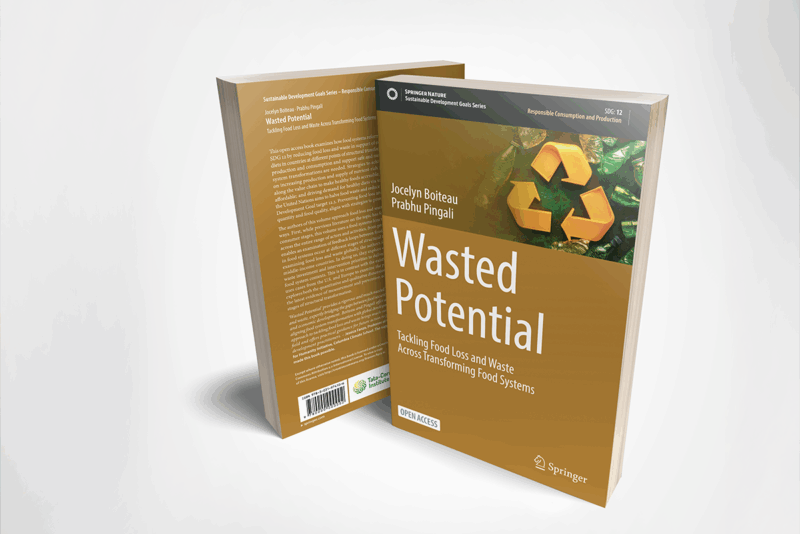Beyond Wages: Exploring the Impact of an Employment Program on Rural Women
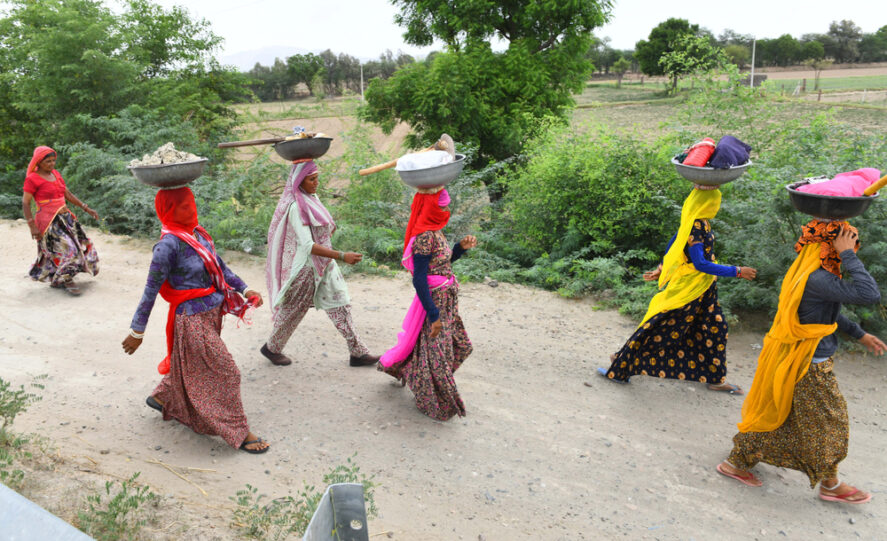
It’s nearly noon and the sun hangs directly overhead. The intense heat makes it tough for Shanta to continue carrying her two-gallon water container. Her colleagues face the same struggle. This is their third day working under the Mahatma Gandhi National Rural Employment Guarantee Scheme (MGNREGS), which provides at least 100 days of paid work per year to rural households willing to perform unskilled manual labor. Shanta’s task, assigned by the rojgar sevak, or employment assistant, is to water young fruit trees in a forest department orchard.
“The rojgar sevak announced this work last week, so I came with the women from my colony,” Shanta tells me, emptying her container around a budding mango plant. “We start work at 8 a.m., break at noon, and resume at 3 p.m. until 6 p.m.”
As a TCI scholar and PhD student at Cornell University, I was in the Chandrapur district of Maharashtra performing field research to gain a clearer sense of how the program impacts women’s lives beyond providing employment and to understand the various factors that influence their decisions to participate in the program.
“Agricultural income is uncertain and insufficient,” [Kusum] says. “Aside from MGNREGS, there’s no work in the village. Whenever nearby towns offer work, both my husband and I migrate.”
Approximately two decades since its inception, MGNREGS has become well-established, with better implementation processes and increased awareness among rural villagers. According to the rojgar sevak, the program has adopted geo-tagging of worksites and worker attendance tracking to enhance efficiency. All administrative tasks are now conducted online, leading to greater transparency in the implementation process. This digital shift has streamlined operations and reduced potential irregularities.
Multiple gram panchayats, or village administration offices, in the Bramhapuri block of Chandrapur district provide MGNREGS work for villagers. Most of these assignments involve watering tasks in forest land. Bramhapuri, one of the fifteen sub-districts of Chandrapur, is situated northeast of the city. The area is primarily known for its paddy cultivation. Many smallholder farmers grow paddy crops in the rainy season from June to November and look for other job opportunities during the winter and summer seasons.
A crucial lifeline for women
In Chorti village, where I met Shanta, livelihood opportunities are limited. Situated about twelve kilometers from Bramhapuri, the village is surrounded by dense forests. Inquiries about forest produce harvesting revealed that villagers refrain from such activities due to the persistent fear of tigers in the area. Many households are involved in goat rearing. They sell their livestock to agents from nearby towns and the neighboring state of Telangana. Marginal farmers without irrigation facilities seek other employment opportunities outside the village for the eight months after they’ve harvested their paddy in November and December. Members of these households—men and women—often migrate long distances, with many going to Karnataka for plantation and harvesting activities.
A villager named Kusum shared her experience of migrating for work. Last year, she spent 15 days working on a plantation and earned Rs. 9,000 ($108), around 75% of the wages she would have received after working 45 days under MGNREGS.
“Agricultural income is uncertain and insufficient,” she says. “Aside from MGNREGS, there’s no work in the village. Whenever nearby towns offer work, both my husband and I migrate.”
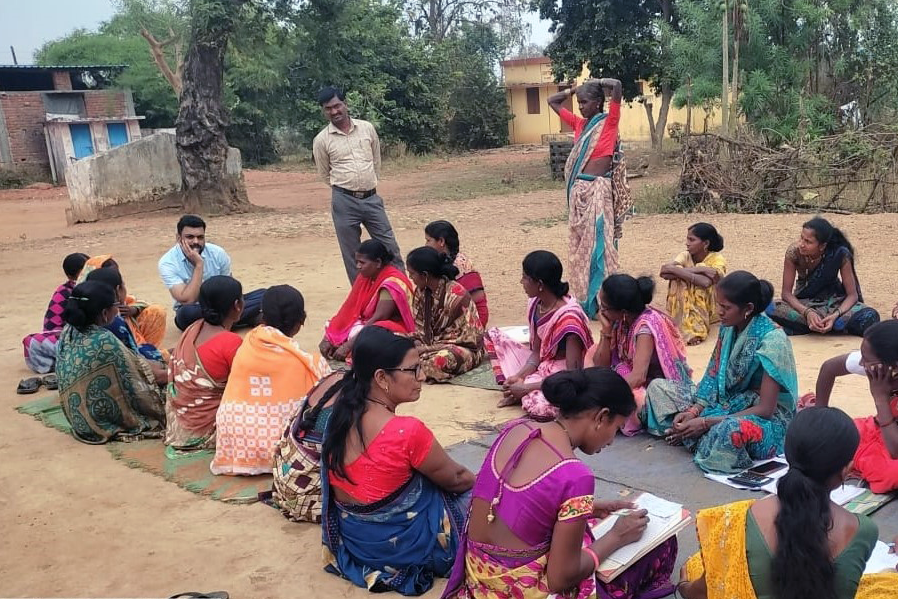
Kasim Saiyyad speaks with a group of women participating in MGNREGS. (Photo provided)
Despite the opportunity to migrate for work and potentially earn higher wages, Kusum prefers to take up MGNREGS employment in her village when it is available. “Working in the village is always better than being far away from family, even if the earnings are slightly lower,” she remarks, glancing at the other women in her group.
MGNREGS serves as a crucial lifeline for illiterate and semi-literate women during lean agricultural periods when work is scarce. The unskilled labor program enables women with limited mobility to find employment opportunities within their own villages. Notably, these women receive wages directly into their own bank accounts, fostering a sense of empowerment and financial independence. This enables women to make informed decisions about household expenditures, savings, and investments in productive assets, thereby contributing to the overall well-being of their families. Kusum’s experiences reflect this newfound financial autonomy.
“When I work under the program, I can purchase groceries from the village shop on credit and settle the dues once I receive my wages,” she explains. “I was even able to save some money from last year’s MGNREGS work, which will allow us to buy inputs for the coming agricultural season.”
Despite the benefits, MGNREGS is not without its flaws. Villagers often face delays in wage deposits, resulting in uncertainty about the timing of payments. Many older villagers rely on information from others regarding their wages being credited.
“Getting to the bank, which is around eight kilometers away, is a challenge,” says one of the elder women in the group. “My son withdraws money from my account using my ATM card when I ask him to.”
A multifaceted decision
Women’s decisions about working under MGNREGS are often influenced by their household responsibilities. Those with elderly parents or young children tend to withdraw from the workforce. Family size also plays a role in determining participation. Joint families can afford to let women delegate some household duties to other members, freeing them to work under MGNREGS. Many women report that the decision to work is often a mutual one involving their husbands and in-laws.
Family members often expect women to manage both household and child-rearing duties, along with agricultural work. Many of the women I spoke to find these responsibilities to be more important than working under MGRNREGS. Financial need is one of the major reasons why they seek work outside the home. Financial independence is also a significant motivator.
“When I work under the program, I can purchase groceries from the village shop on credit and settle the dues once I receive my wages,” [Kusum] explains. “I was even able to save some money from last year’s MGNREGS work, which will allow us to buy inputs for the coming agricultural season.”
I also encountered a few families where female members did not participate in MGNREGS. These households mostly owned larger plots of land with irrigation facilities. The women preferred working on their own farms while managing household activities. They often didn’t have direct access to cash, instead relying on family members for household expenses. Their husbands or sons typically handle grocery shopping. The women also tend to visit the weekly market less frequently.
Building community through work
During another workday, I had the opportunity to chat with Pooja, a newly married young woman in the village. It was her first day working under MGNREGS, and she had accompanied her mother-in-law to the site. For Pooja, the worksite serves as a valuable platform to familiarize herself with the other women of the village. The midday break allows her to engage in conversations with her new colleagues, facilitating her transition into the role of a married woman within the community. Through these informal interactions, Pooja can gradually form meaningful friendships, easing her integration into the village’s social fabric.
Break time is also used by members of self-help groups to share information about upcoming meetings and plans. This way, no one misses out on important updates regarding these community groups.
As evening approaches, the women return to work, feeling refreshed not just from the break, but also from the sense of community they experience at the worksite. Their laughter and chatter echo through the orchard, showing that, beyond just earning wages, the women form strong social bonds through MGNREGS.
Understanding women’s employment and sociocultural dynamics
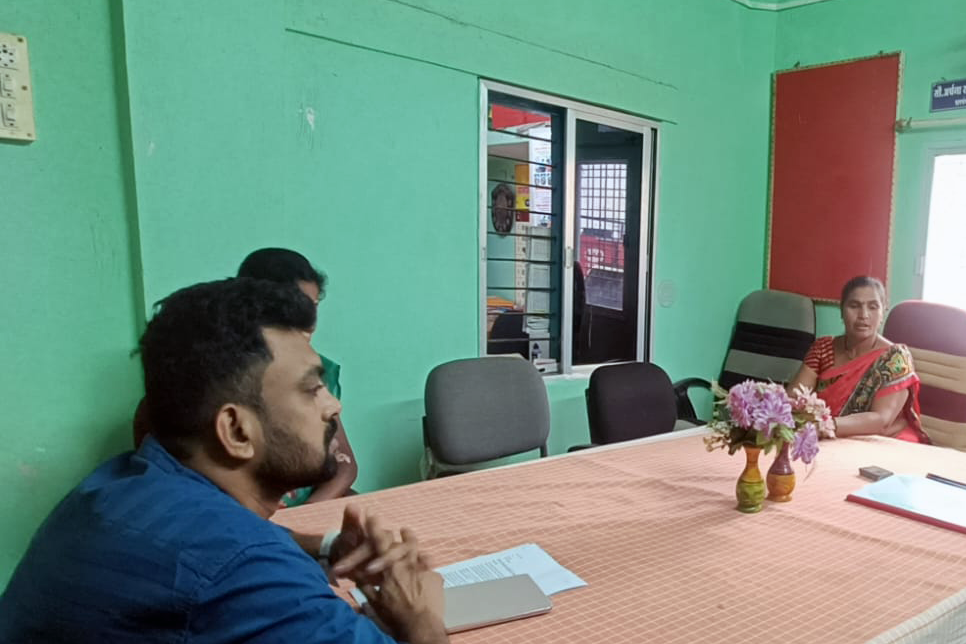
Kasim Saiyyad meets with local administrators to discuss MGNREGS. (Photo provided)
The experiences of the women workers in Chorti village underscore the complex interplay between employment opportunities, financial autonomy, and sociocultural dynamics within rural households. While MGNREGS has undoubtedly provided a crucial safety net and a source of income for these women, their participation is influenced by a multitude of factors, including household responsibilities, family dynamics, and the availability of alternative income sources.
The recent introduction of unconditional cash transfer programs like the Pradhan Mantri Kisan Samman Nidhi (PMK) raises intriguing questions about the potential impact on women’s engagement with MGNREGS and, consequently, their financial independence, dietary diversity, and childcare responsibilities. As these cash transfers provide an additional source of income for rural farming families, it is crucial to investigate the gendered effects and intra-household dynamics that may arise.
Addressing these research questions through forthcoming fieldwork could yield valuable insights into the intricate decision-making processes within households and shed light on the interrelated aspects of women’s economic empowerment, nutrition, and childcare practices. Such an exploration could inform policy interventions and programmatic strategies to ensure that the benefits of various government initiatives are optimized while promoting gender equality and the overall well-being of rural communities.
Kasim Saiyyad is a TCI scholar and PhD student in the field of applied economics and management.
Featured image: A group of women walk home after working at an MGNREGS work site in Rajasthan, India. (Sumit Saraswat/Shutterstock)



